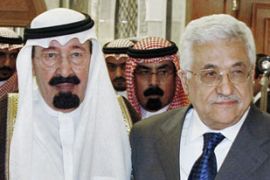Quartet: Israel key to Mecca deal
Middle East mediators say any Palestinian unity government must recognise Israel.

| Your Views |
|
“If these two factions unite, will they leave Israel alone and get on with furthering the fortunes of their own people?”
Bainatluc, Kitchener, Canada
|
The Quartet – which consists of the European Union, Russia, the United Nations and the United States – issued a statement on Friday saying it “expressed hope that the desired calm would prevail” following the agreement between Palestinian leaders reached in Mecca, Saudi Arabia, on Thursday.
Mahmoud Abbas, the Palestinian president and head of Fatah, Khaled Meshaal, the political leader of Hamas, and Haniya reached the deal during talks mediated by Saudi King Abdullah bin Abdulaziz after days of factional fighting in Gaza.
Hamas agreed that it would “respect” past peace deals with Israel as part of the power-sharing accord with Fatah.
‘Hamas victory’
Tzachi Hanegbi, who heads the foreign affairs committee of the Israeli parliament, told Israel Radio: “Abu Mazen failed completely and he awarded a significant victory to Hamas.
“As a result, the chance of advancing an effective initiative and an agreement between Israel and the Palestinians has receded.”
The Quartet have said their demands must be met before international relations and financial aid, which were halted after Hamas came to power in March 2006, are resumed.
The Quartet will meet in Berlin on February 21 “to continue their consideration of these developments, and to review formation and implementation of the agreement on the government.”
“The Quartet will discuss the way ahead at the February 21 meeting,” the statement added.
‘Important step’
The Arab League has hailed the Mecca accord, hoping it would end the political crisis in the territories.
In a statement, Amr Moussa, the league’s secretary-general, expressed “hope and trust that the agreement would end the political deadlock … allowing Palestinians to focus on their primary cause which is the formation of a Palestinian state with Jerusalem as its capital.”
| “One should consider that shifting political positions does not happen overnight and one should be patient and give time to allow these transformations to take place” Riad Mansour, the Palestinian UN observer |
Moussa called on the Quartet to take note of “this important step” and of the need to lift the financial boycott of the Palestinians.
Abbas, in a letter reappointing Haniya as prime minister, said the new government should abide by “international law” and agreements signed by the Palestine Liberation Organisation.
Saeb Erekat, an Abbas adviser and chief Palestinian negotiator, met Condoleezza Rice, the US secretary of state, on Friday to discuss the deal, known as the Mecca Declaration, ahead of a three-way summit scheduled for February 19.
According to Riad Mansour, the Palestinian UN observer, Erekat noted Rice’s cautious reaction to the agreement and said it should be judged on actions and results.
“You want to study thoroughly the Mecca agreement and read between the lines, especially with regard to honouring and respecting old agreements,” Mansour quoted Erekat as saying.
“One should consider that shifting political positions does not happen overnight and one should be patient and give time to allow these transformations to take place,” Mansour said.
Sufian Abu Zaida, a senior Fatah official, said the goal of the unity government deal was to end the factional fighting that has raged for months between the factions, rather than meet the three conditions set out by the Quartet for ending the economic blockade.
“They did not think of Condoleezza Rice, [US president George] Bush, Israel, the Americans, the Quartet. … Mainly they considered how to avoid bloodshed,” he told Israel Radio.
Hani Habib, a Palestinian political analyst, said an agreement was reached on a unity government because neither side was strong enough to win militarily.
The US has pledged $86m to strengthen Abbas’s forces; Hamas receives support for Iran and other Islamic allies.